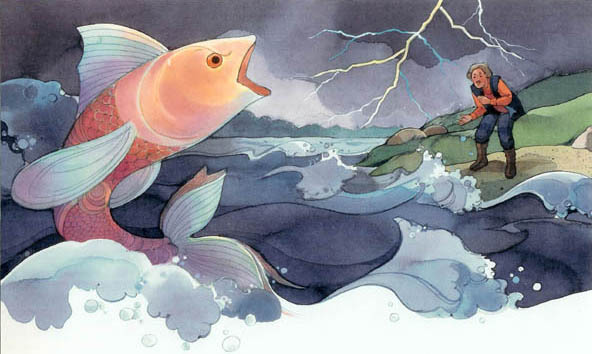
Our postmodern age boasts a proliferation of phobias, syndromes, addictions and afflictions.
I’d like to make my own modest contribution by discussing Fisherman’s Wife Syndrome. (It might be more politically correct to call it Fisherperson’s Nagging Domestic Partner Syndrome, but it loses something in the translation.)
Remember the poor fisherman’s wife of fairy tale fame? She exists in many different versions and cultures. In the story, her husband catches an enchanted fish which pleads for its life.
In return, it promises to grant the man anything he asks. The fisherman releases the fish, and, like a good husband, promptly goes home to ask his better half what he ought to wish for.
Like many a wife, she has a list ready. Much to the husband’s dismay, she sends him back to the fish again and again, each time asking for more. Initially, she requests—and is granted—riches and a succession of increasingly grand houses.
Still dissatisfied, however, she asks for power: first temporal, then cosmic—in one version, the wife wants to be pope, then God (some things never change).
At this last request, the magic fish grows angry and, in a violent storm, takes everything away, leaving the couple in their original, impoverished condition. (One wonders why the husband is thus punished—perhaps for allowing his wife to rule and oppress him as she does. He might have kept mum about the fish, wished for a bigger tackle box, and called it a day.)
Fisherman’s Wife Syndrome (FWS) is an amalgamation of the deadly sins of envy, avarice and pride, with a little anger and ingratitude thrown in for good measure.
Covetousness (whether for riches, power or prestige) has been christened by contemporary society; now it’s called ambition, discriminating taste, wanting ‘the good life’ –often at any cost.
It affects believers and non-believers alike, even those who think they aren’t materialistic. In our newlywed, apartment-dwelling days, I thought our spirit of detachment resulted from being such good Christians.
Now I know it was caused by low wages, an obsession to save money, and a semi-nomadic lifestyle. Since settling in our own house, dissatisfaction and a steady acquisition of goods have crept up on us like a slow disease.
Suddenly we cannot live without a big screen TV (is our eyesight really getting that poor?); I’m forever complaining about the décor (more accurately, the lack thereof), the age of the appliances, the overall deficiency of the square footage.
“We have seven children,” I kept telling people, as if it was all my girls’ fault. In reality, it’s the STUFF belonging to the seven children – and their parents – for which we have insufficient space.
Then there are the non-material ambitions. I was fortunate enough to attend university, but who can be happy with just a BA? I want an MA, a PhD, a whole alphabet behind my name.
Then there’s the writing ‘career’ (I use the term loosely). You’d think it would be enough to publish a few articles, witness to my faith, make many wonderful friends, and earn a little pocket money on the side.
But no. I want to be sought after by all the most prestigious papers and magazines, write bestsellers (half a dozen or so), go on speaking tours, make lots of money.
Whether it’s a mid-life thing or not, it comprises what Alice von Hildebrand calls “illegitimate suffering” – the kind that’s unnecessary and self-inflicted, as opposed to a cross that the Lord has given you to carry.
Even when you realise you have FWS, and are determined to change, it’s difficult to focus on your blessings and kick the habit of complaining about what you haven’t got or haven’t achieved. It’s enough to make a magic fish cry—or rage.
One wonders if things like hurricanes, wildfires, floods and tornadoes come along just to remind us what’s important in life. And what’s not.
O God, giver of all good gifts, visible and invisible, help us to be grateful for what we have, and generous with those who are in need.
Mariette Ulrich is a humble homemaker. She lives contentedly in an adequate house with her wonderful family in western Canada. (Well, one can dream.)